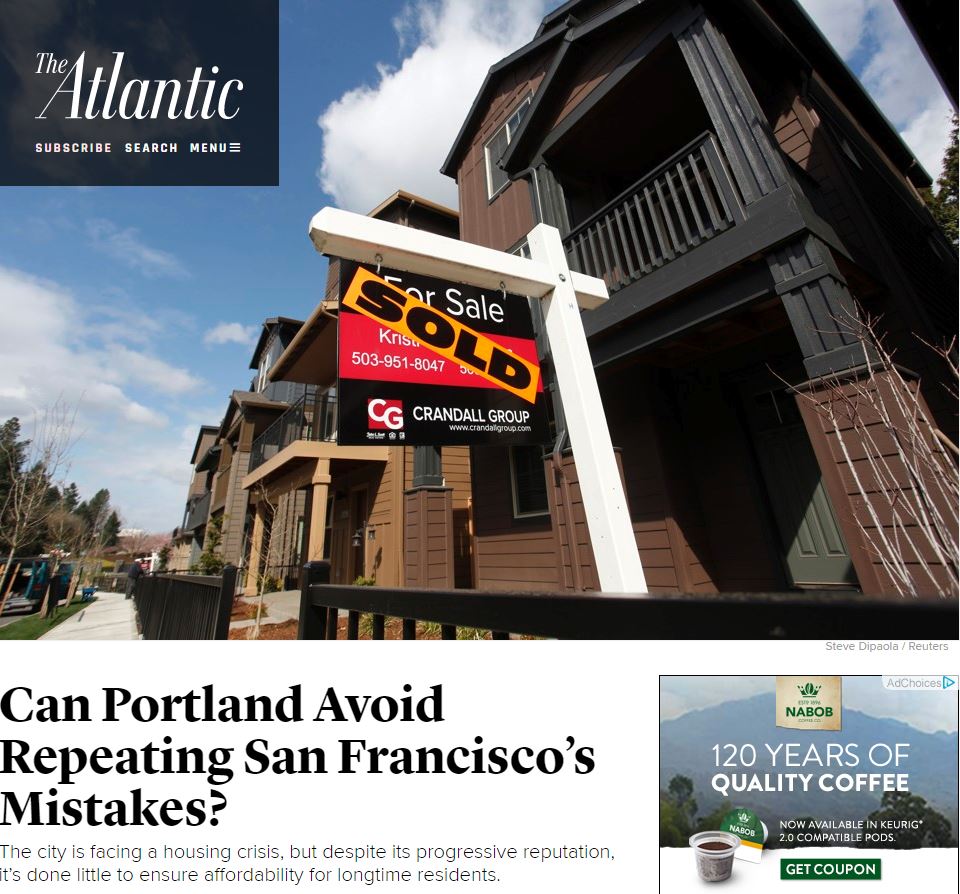.
Portland was so affordable, as the slogan went, that young people went there to retire.
Then the city got “discovered,” people started flocking here, the tech companies came, and Portland became more expensive. Oregon has been the top destination for people to move to for three years in a row, according to United Van Lines. …
Now, housing prices are skyrocketing in this city of 600,000, as more people move in and new high-rises and apartment complexes go up. Apartment rents are rising at an annualized rate of 14 percent, one of the largest increases in the country. More than half of the city’s tenants spend more than 30 percent of their income on rent. News stories abound of whole buildings raising their rent by 20 percent or by $500, or more. Evictions have skyrocketed as landlords make room for new residents with bigger salaries. …
“I think that there’s a general sense that Portland is progressive enough to be assumed to be doing the right thing, and that’s not the case,” Cameron Herrington, the anti-displacement coordinator at Living Cully, a coalition of neighborhood groups in Northeast Portland, told me.
Until March, the state banned inclusionary zoning, which mandates that new buildings include a certain number of affordable units. There’s no rent control in Oregon, and efforts to pass just-cause eviction laws have, thus far, been futile. The city has embarked on big urban-renewal projects in the past few decades without putting measures in place to ensure that tenants in those neighborhoods won’t be displaced. In September, the Community Alliance of Tenants, a nonprofit advocacy group, declared a renter state of emergency, asking for a year-long moratorium on no-cause lease terminations, and demanding that tenants receive a year’s notice for rent hikes over 5 percent.
The city has tried to respond. In October, the Portland City Council declared a housing emergency, focused more on helping the city’s growing homeless population by waiving some city laws to allow the creation of temporary homeless shelters. Later that month, the city council unanimously approved a law that requires landlords to give 90 days notice for no-cause evictions and for rent increases of more than 5 percent. Mayor Charlie Hayes has set aside $20 million for affordable housing in North and Northeast Portland. People who have lived in Northeast Portland, which was for decades majority African American, or who have family roots in the area, will get first preference. …
“There are limits to white urban liberalism,” Justin Buri, the executive director of the Community Alliance of Tenants, tells me. “When it comes to housing and schools, all of that goes out the window.” …
Between 2000 and 2010, Portland became even whiter, not just because more white people moved to the center city, but also because black people and Latinos moved to the city’s outer edges and suburbs.
.














OMG! Actual supply and demand economics!
Now Portland cannot be cited any longer in an attempt to enhance the myth that Vancouver’s housing affordability crisis is the sole result from dirty, filthy lucre from Mainland China.
Supply and demand for land upon which houses are built. Ultra-low interest rates. Speculation, both local and foreign. Zoning from 1950. A lack of engagement by senior governments to address loopholes in foreign ownership rules, and to collect real data. All of these act together to create a nasty problem, and it’s not just about the Chinese.
You are not mentioning the Boom in Portland tech jobs driving up incomes therefore rents/house prices and demand. The complete opposite of what’s happening in Vancouver.
Tell that to my brother who has been working in IT start-ups and tech-related academia for two decades.
While true that Vancouver’s growth in tech isn’t earthshattering, it’s still significant, and is expected to get better.
https://www.biv.com/article/2014/12/vancouvers-tech-sector-centre-job-growth-through-2/
Tech companies in Vancouver cannot attract talent due to Housing costs, wouldn’t be surprised if Hootsuite left, among others
http://vancouversun.com/news/local-news/housing-costs-clear-and-present-danger-to-metros-economy
Portland has a long way to go to be in the same unaffordability range as Vancouver. You can get a house in Portland for 300k, and you’re still within 10 km’s of the city centre.
Portland has no land constraints. It will never be an unaffordable place to live (imo).
Portland does indeed have land constraints (on the Oregon side), an urban growth boundary:
http://www.oregonmetro.gov/urban-growth-boundary
“More than half of the city’s tenants spend more than 30 percent of their income on rent.”
In the City of Vancouver that number was 46% in 2011. 44.7% for Metro Vancouver. Corresponding numbers for 2006 are 45% and 43.4% for city and metro. Would not want to guess what the numbers are right now, but won’t be surprised if Portland has it worse than Vancouver by that metric right now.
I know people spending 110% of their income on rent. They’re having to borrow money just for somewhere to live.
But I don’t have a solution.
I can see those in the data too. And 25% of renters in CoV spend more than 50% of income on housing, those are seriously stretched.